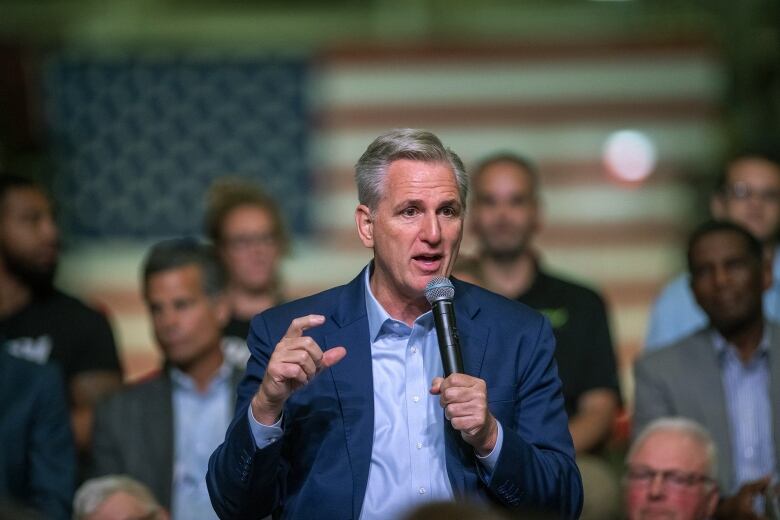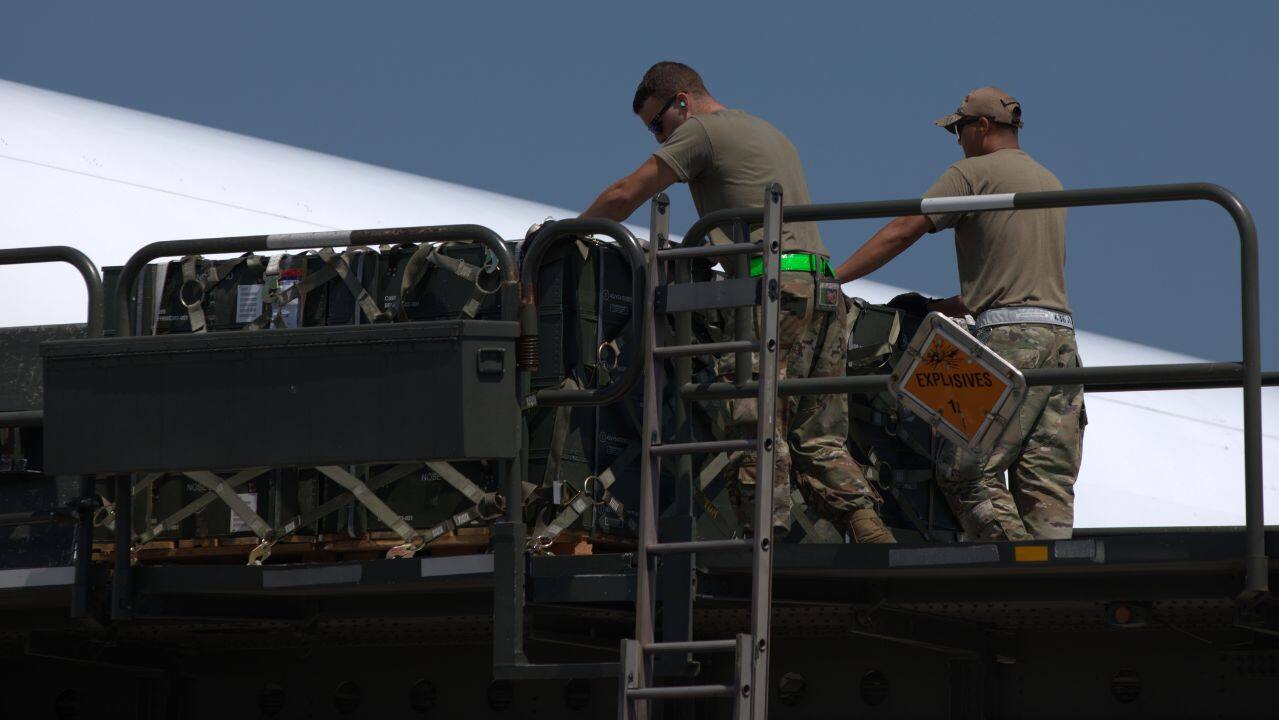Pence calls out Republican ‘Russia apologists,’ as midterms could threaten Ukraine aid | CBC News
Former U.S. vice-president Mike Pence made the rounds in Washington this week with some high-profile speeches, becoming almost misty-eyed in describing how Ronald Reagan helped galvanize his transition from a young Democratic Party supporter to a staunch Republican.
Republicans have long lionized Reagan for projecting American strength in dealing with the Soviet Union in the last years of the Cold War era. But today’s GOP only rarely resembles the hawkish foreign policy group that stretched from Reagan through to the George W. Bush presidency.
In a speech at the conservative Heritage Foundation, Pence lamented some recent comments coming from Republicans in Congress when it comes to Russian aggression in Ukraine.
“There can be no room in the conservative movement for apologists to [Vladimir] Putin. There is only room in this movement for champions of freedom,” he said.
“Appeasement has never worked, ever, in history.”

Pence’s comments came a day after Kevin McCarthy, potentially the next Speaker, raised hackles with comments on future Ukraine aid if the Republicans win control of the House after next month’s midterms.
“I think people are gonna be sitting in a recession and they’re not going to write a blank cheque to Ukraine,” McCarthy told Punchbowl News.
Those comments followed a key stopgap funding bill late last month to avoid a government shutdown, which also included Ukraine aid. Only about two handfuls of House Republicans supported it; McCarthy and his leadership team were not on board.
In the spring, 57 House Republicans in the Democratic-led House voted Nay on a specific Ukraine aid bill.
Dominant player in Ukraine aid
The stakes are huge for Ukraine, of course, and for Western unity against Russia.
American security assistance since Russia invaded Ukraine on Feb. 24 stood at more than $17.5 billion US after a munitions and military vehicle package was announced last week, while U.S. supplies of High Mobility Artillery Rocket System (HIMARS) have been viewed as consequential in Ukraine’s fight.
In a rare sit-down interview, Ukrainian President Volodymyr Zelenskyy talks to Canadian journalists in Kyiv about the increase in attacks on the capital, the prospect of peace with Russia and Canada’s contribution to the war effort.
According to a recent analysis from The Economist, the American support of military, financial and humanitarian aid, in total dollars, dwarfs the sum total of that given by the European Union and Europe’s NATO members (though given the sheer size of the U.S. economy, several small- to medium-sized European countries have given a greater share as a percentage of GDP).
You all might not see it, but Trump’s surrogates have been waging a pretty relentless campaign defending Putin’s invasion and against supporting Ukraine. We are just now seeing the results in polling. <a href=”https://t.co/XO0KIW7Fth”>https://t.co/XO0KIW7Fth</a>
—@ChrisMurphyCT
Democratic congressman Eric Swalwell, in an op-ed for Newsweek directed at McCarthy’s comments, feared the symbolic message a significant reduction in U.S. support could bring, both in stopping the gains Ukraine have made on the battlefield but also for the “hopes for democracies worldwide.”
Democratic Sen. Chris Murphy tweeted concern that Republican ambivalence is affecting how the American public views Ukraine aid, too.
Ukraine as ’51st state’
Some Republican candidates in House and Senate races have shown a withering indifference to the plight of the Ukrainians, echoing the “America First” foreign policy touted by former president Donald Trump.
“Another billion to Ukraine…,” Texas congressional candidate Wesley Hunt tweeted in August. “At this rate we should at least make them the 51st state so they can start paying some federal income tax.”
CBC’s David Common gets a rare look at some of the weapons the U.S. is sending to Ukraine from Dover Air Force Base in Delaware to find out more about the crucial role Western nations are playing in Ukraine’s fight against Russia.
To the extent that Republican opposition or hesitancy exists, several factors have been mentioned: the priority of the myriad domestic issues the U.S. faces, such as inflation and immigration; an overriding concern that China is the bigger threat; and grievances with European nations for perceived freeloading off of American support of NATO.
“I gotta be honest with you, I don’t really care what happens to Ukraine one way or another,” said J.D. Vance, a candidate for the U.S. Senate from Ohio, in February.
Vance has since chosen his words more carefully, but he and others have pleaded for a negotiated peace deal as soon as possible.
Trump looms large
Trump, still a figure of influence within the party, has been taking Putin’s nuclear threats seriously and assailing what he sees as the Biden administration’s largesse toward Ukraine. On his Truth Social site and in rallies, Trump has encouraged Russia and Ukraine to negotiate, or “we will end up in World War III and there will be nothing left of our planet, all because stupid people didn’t have a clue.”
During his presidency, Trump was criticized for his flattery of Putin and ambivalence toward Ukraine’s future. Trump’s strong-arm tactics for personal gain while dealing with President Volodymyr Zelenskyy culminated in the first Democrat-led impeachment of Trump.
Trump has also railed against the level of defence expenditures by NATO members, which echoes in the comments of people like Arizona Republican Senate candidate Blake Masters, who has labelled the Russia-Ukraine conflict a “European problem.”
Sen. Josh Hawley, the lone Republican recently to not vote in favour of approving Sweden and Finland for NATO membership, said by way of explanation that the U.S. shouldn’t abandon that alliance, but that European nations needed to do more to ensure their own security interests, and that the American focus is needed on the threat of Chinese Communist Party dominance in Asia.
A similar view that Pentagon priorities can’t drift from China’s claims on Taiwan and in Asian waters was recently made by Republican House Whip Steve Scalise.

Republican recalcitrance in the House on Ukraine could set up some heated discussions within their caucus in 2023, and with Senate counterparts regardless of who wins that chamber.
Republican Mitch McConnell, who could become Senate majority leader again, has voiced support for Ukraine aid and made an unannounced trip to Kyiv in the spring, meeting with Zelenskyy.
In contrast to McCarthy, McConnell — who entered Congress during the Reagan years — admonished the Biden administration for not getting Ukraine aid out the door more quickly.
For all the latest World News Click Here
For the latest news and updates, follow us on Google News.



